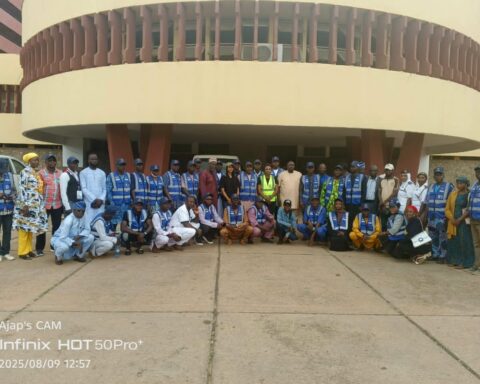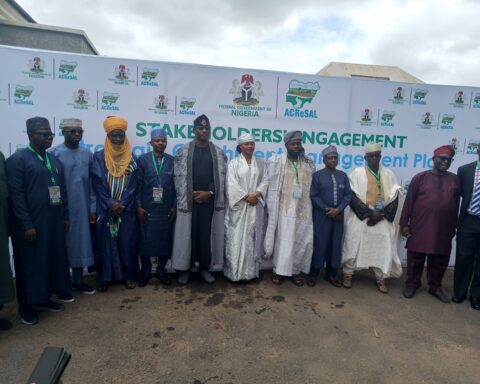In an effort at advancing environmental sustainability and reclaim degraded landscapes, the Kwara Agro-Climatic Resilience in Semi-Arid Landscapes (KWACReSAL) has begun sensitisation visits to communities selected for urgent intervention across the state.
The state project coordinator, Shamsideen Olatunbosun Aregbe, led the delegation to three beneficiary communities Shonga in Edu Local Government Area, Lata-Nna in Patigi LGA, and Alapa in Asa LGA where he disclosed that implementation of projects will begin immediately, in line with directives from the Kwara State Governor, AbdulRahman AbdulRazaq.
Speaking during the visit to Shonga, Mr Aregbe said the community had been earmarked for the restoration of 2,000 hectares of degraded land, with digital mapping (shape files) already completed.
The intervention also includes drilling of solar-powered boreholes, reticulated for irrigation to support planted seedlings.
He added that all labour and services for the project would be sourced within the host communities to stimulate local economies and provide livelihood opportunities.
The Emir of Shonga, Alhaji (Dr.) Haliru Ndanusa Yahaya, expressed appreciation to the state government, World Bank, and ACReSAL team for including his community among the project’s beneficiaries.
The monarch lamented the destructive impacts of annual flooding on local agriculture and livelihoods, noting that the ACReSAL intervention is “timely and critical for improving the resilience of Shonga’s farming system.”
At Lata-Nna, the project coordinator confirmed that development work will begin on the Lata Grazing Reserve, which is among the priority areas under the initiative.
“Lata is one of our catchment communities. We will construct access roads, drill six solar boreholes, install solar-powered streetlights, and plant trees and grasses for improved grazing and ecosystem health,” Mr Aregbe said.
The Director of Forestry, Idris Mahmud Babatunde, highlighted that the project will provide long-term solutions to climate-related challenges, including addressing the recurring herder-farmer conflicts in the region.
Also speaking, Director of Water Services, Wopa Yusuf, commended the state’s leadership for prioritising rural infrastructure and urged community members to take ownership of the facilities.
The Etsu Yankpa of Lata, Ahmed Mohammed, lauded the state government and partners for the intervention and prayed for its timely execution.
During the team’s stop at Alapa community, Mr Aregbe revealed that 1,000 hectares of land had been allocated for tree planting, with immediate commencement of work, including the rehabilitation of the Alapa Waterworks.
Confirming the development, Mr Yusuf said the rundown waterworks infrastructure would be restored, including borehole drilling and reticulation to support both domestic and irrigation uses.
He called on residents to safeguard the public infrastructure for sustainability.
Representing the focal NGO team, Mohammed Jummah Kayode reaffirmed ACReSAL’s dedication to delivering on its project development goals and urged local participation to ensure its success.
In response, the Magaji of Alapa expressed gratitude to the state government, World Bank, and the ACReSAL team, pledging full support for the project’s success.
By Dare Akogun








